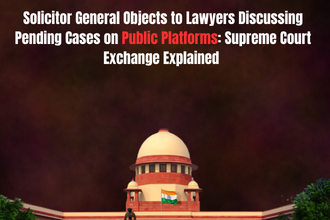In a significant ruling that will influence future contractual disputes, the Supreme Court of India has laid down comprehensive guidelines for the interpretation of contracts and deeds. The judgment in Annaya Kocha Shetty (Dead) through LRs v. Laxmibai Narayan Satose (Since Deceased) through LRs & Others, cited as 2025 LiveLaw (SC) 411, reaffirms the supremacy of the literal interpretation rule while also highlighting exceptions under which courts can deviate from it.
Background of the Case
The case revolved around the interpretation of a “Conducting Agreement” dated August 16, 1967, entered into for operating a hotel business. The plaintiff asserted that the agreement conferred tenancy or license rights, thereby entitling him to protection under the Bombay Rent Act, 1947. However, the defendants maintained that the agreement was merely a commercial arrangement to operate the business, not a lease or license.
The trial court sided with the plaintiff, interpreting the agreement as a leave and license contract. However, the appellate court reversed this decision, and the High Court upheld the appellate findings. Aggrieved, the plaintiff approached the Supreme Court.
Key Supreme Court Observations
The bench, comprising Justices Pankaj Mithal and SVN Bhatti, dismissed the appeal and offered detailed guidelines on how courts should interpret deeds and contracts:
1. Literal Rule of Construction
The Court emphasized that when the language of the contract is clear and unambiguous, the literal meaning must prevail. Referring to Provash Chandra Dalui v. Biswanath Banerjee (1989 Supp (1) SCC 487), the Court noted:
“The court must look at the words used in the contract unless they are such that one may suspect that they do not convey the intention correctly.”
This principle is fundamental to contract interpretation. Courts are not to rewrite agreements but to enforce them as written.
2. Golden Rule of Construction
In cases where a literal reading produces an absurd result, courts may deviate and apply the golden rule of construction. This allows the interpretation to be adjusted slightly to avoid outcomes that contradict the contract’s intent.
3. Purposive Construction
The Court also noted that contracts may be interpreted purposively, i.e., in light of their object and surrounding context. However, this approach must be used cautiously, and only when ambiguity exists in the language.
Interpretation of the “Conducting Agreement”
Applying the above principles, the Court found no ambiguity in the agreement dated August 16, 1967. The judgment clarified that:
- The agreement did not grant possession of the property to the plaintiff.
- The plaintiff was required to pay royalty, indicating a commercial arrangement for running the hotel.
- No lease or license rights were granted under the agreement.
The absence of any clause discussing possession led the Court to hold that no tenancy or license was created.
Sections 91 and 92 of the Indian Evidence Act, 1872
The Court also analyzed the applicability of Sections 91 and 92 of the Indian Evidence Act. It reiterated:
- When an agreement is in writing, oral evidence cannot be introduced to contradict its terms.
- Exceptions apply only in cases of fraud, mistake, or other situations outlined under the proviso to Section 92.
Hence, the plaintiff’s attempt to introduce extrinsic oral evidence was rejected.
Importance of Possession and Ownership Distinction
The Court drew a crucial distinction between ownership of a business and tenancy rights in a property. Citing Section 108 of the Transfer of Property Act, 1882, the Court observed that a lease implies a separation of ownership and possession. In the case at hand, the agreement transferred only the business ownership, not possession of the premises.
This reinforced the view that the agreement was merely for conducting business, not a tenancy agreement.
Legal Significance of the Ruling
This ruling is particularly relevant for:
- Landlords and tenants involved in disputes over the nature of agreements.
- Legal professionals interpreting ambiguous clauses in deeds.
- Commercial entities engaging in licensing or conducting agreements.
The Court’s reaffirmation of the literal rule of interpretation ensures greater certainty and discourages parties from creatively reinterpreting contracts for litigation purposes.
Practical Takeaways
- Draft Clearly: Always use precise, unambiguous language in contracts. Avoid vague or overlapping terms.
- Specify Possession Rights: If possession is part of the agreement, it must be clearly stated.
- Avoid Oral Modifications: Once an agreement is in writing, oral modifications or contradictions are inadmissible unless they fall under the exceptions in the Evidence Act.
- Consult Precedents: Rulings like Annaya Kocha Shetty serve as vital references in similar legal disputes.
Conclusion
The Supreme Court’s judgment in Annaya Kocha Shetty v. Laxmibai Narayan Satose serves as a cornerstone for contractual interpretation in Indian jurisprudence. By reinforcing the literal interpretation rule and clarifying the legal framework under the Evidence Act and Transfer of Property Act, the Court has provided much-needed clarity in resolving disputes involving business conduction agreements, leases, and licenses.
For legal professionals and businesses alike, this ruling is a strong reminder that words matter, and well-drafted agreements are essential to avoid litigation.


